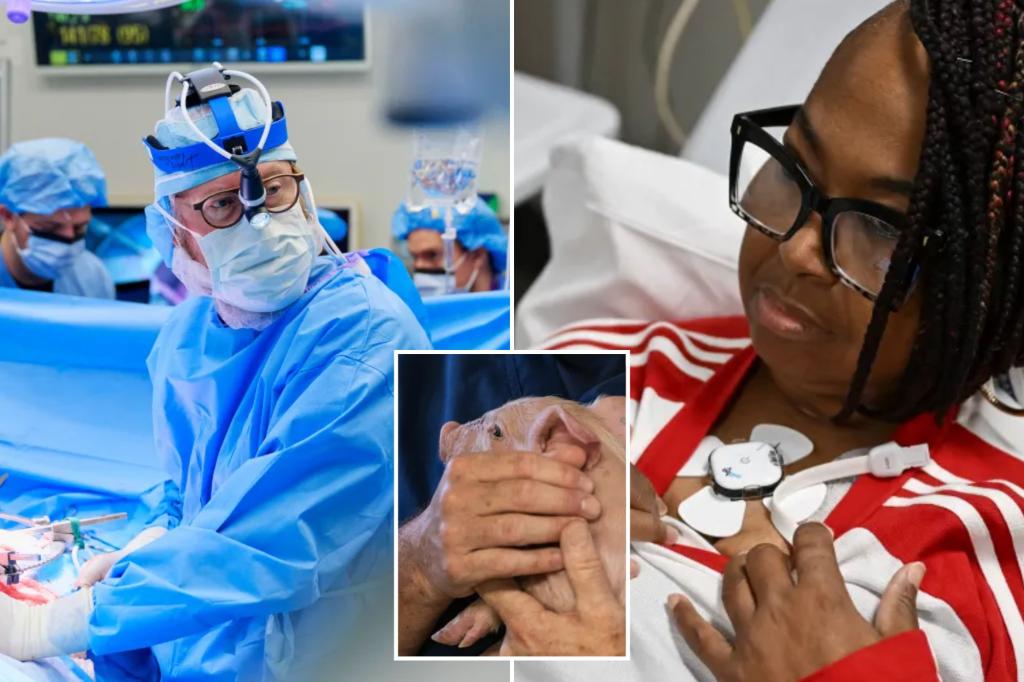Towana Looney, a 53-year-old woman from Gadsden, Alabama, has achieved a significant medical milestone by becoming the longest-living recipient of a pig kidney transplant. Sixty-one days after the groundbreaking surgery, Looney is thriving, exhibiting robust health and remarkable energy levels. Her remarkable recovery is a testament to the advancements in xenotransplantation, the process of transplanting animal organs into humans, and offers a beacon of hope for thousands awaiting life-saving organ transplants. Looney’s journey began with a selfless act – donating a kidney to her mother in 1999. However, later pregnancy complications led to high blood pressure and irreversible damage to her remaining kidney, eventually requiring her to undergo dialysis for eight years. Due to the development of highly reactive antibodies, Looney faced a bleak prospect of receiving a human kidney transplant, prompting her to consider the experimental pig kidney transplant.
The pioneering procedure, performed by Dr. Robert Montgomery of NYU Langone Health, involved a genetically modified pig kidney to minimize the risk of rejection. This innovative approach addresses the critical shortage of human organs for transplantation, with over 100,000 people in the U.S. currently on the transplant waiting list, many of whom need kidneys. Looney’s case falls under the “compassionate use” category, allowed by the Food and Drug Administration (FDA) for patients with no other viable options. Her progress is not only vital for her own health but also serves as invaluable data for future xenotransplantation research and clinical trials, contributing to the potential for wider application of this life-saving procedure. While only a handful of hospitals are currently conducting these experimental transplants, their collaborative efforts in sharing data and learnings are paving the way for the first formal xenotransplantation studies expected to commence this year.
Looney’s recovery has been closely monitored by Dr. Montgomery’s team, who meticulously track her blood tests and other key indicators. Approximately three weeks post-transplant, they detected subtle signs of rejection, knowledge gleaned from a previous experiment where a pig kidney functioned for 61 days in a deceased donor’s body. This crucial learning allowed them to promptly and effectively treat Looney, preventing further rejection. The collaboration and knowledge sharing within the medical community working on xenotransplantation have played a critical role in the success of Looney’s case. The experience gained from previous cases, including the study involving a deceased donor, has been instrumental in recognizing and effectively managing the challenges associated with pig organ transplantation.
Beyond her personal health journey, Looney has embraced the role of an advocate for xenotransplantation, providing support and sharing her experience with others considering this option. She connects with individuals through social media, offering reassurance and guidance to those facing the arduous wait for a transplant. Looney emphasizes the importance of personal faith and introspection in making such a significant decision, encouraging individuals to consult their beliefs and inner guidance. Her willingness to share her experience and offer support underscores her commitment to advancing the field of xenotransplantation and helping others navigate this complex and potentially life-saving procedure.
The long-term viability of Looney’s transplanted kidney remains uncertain, and the medical team continues to monitor her closely. While the potential for future challenges exists, Looney’s remarkable progress marks a significant achievement in xenotransplantation. Her case demonstrates the potential of genetically modified pig organs to address the critical shortage of transplantable human organs, offering a ray of hope for those awaiting life-saving transplants. Looney’s resilience, coupled with the dedication of the medical team and the advancements in xenotransplantation, holds promise for a future where animal organ transplants become a viable solution for patients in need.
The success of Looney’s case is not just a personal triumph but a significant step forward for the entire field of xenotransplantation. Her remarkable recovery provides valuable data and insights that will inform future research and clinical trials, potentially paving the way for wider application of this life-saving procedure. Looney’s journey highlights the collaborative efforts of the medical community and the importance of knowledge sharing in pushing the boundaries of medical innovation. Her case also underscores the ethical considerations surrounding xenotransplantation, including the genetic modification of animals and the potential risks to recipients.
As Looney continues to recover and thrive, her story serves as a symbol of hope and progress in the quest to alleviate the critical shortage of transplantable organs. Her journey is a testament to the power of scientific innovation and the resilience of the human spirit in the face of adversity. Looney’s experience offers a glimpse into a future where xenotransplantation may become a routine procedure, offering a lifeline to thousands of patients waiting for a chance at a healthier life. Her case underscores the importance of ongoing research and ethical considerations as the field of xenotransplantation continues to evolve.










